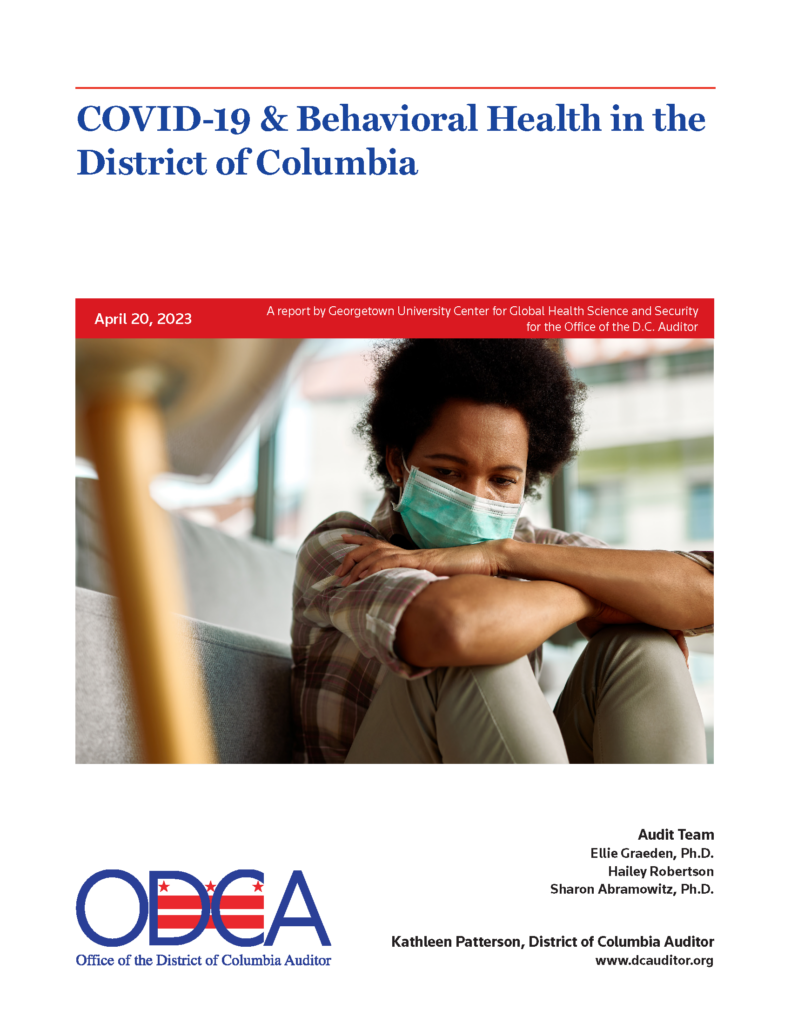COVID-19 Pandemic Impacted Behavioral Health in D.C. and Drove Significant Growth in Telehealth Care

Posted in News Release | Tagged Behavioral Health, COVID-19, District of Columbia, mental health, pandemic, public health, telehealth
Media Contact
Karen Teber
km463@georgetown.edu
WASHINGTON (April 20, 2023) — The COVID-19 pandemic drove an increased demand for behavioral health services, but thanks to an increase in the availability of telehealth services, a greater number of residents successfully accessed virtual care during the pandemic than in years prior, according to a new report commissioned by the Office of the D.C. Auditor (ODCA).
The report, “COVID-19 & Behavioral Health in the District of Columbia,” was prepared by the Georgetown University Center for Global Health Science & Security and will be presented April 20 at 9:15 a.m. followed by a panel discussion.

The authors found that mental health diagnoses increased 15% during the COVID-19 pandemic in D.C., while telehealth-eligible service visits increased by 97% among Medicaid enrollees. By April 2020, approximately 50% of all beneficiaries receiving telehealth-eligible behavioral health services were receiving these services via telehealth, compared to only 0.01% prior to March 2020.
“We saw a huge spike in people using telehealth services as they became more widely available, and it didn’t go away when in-person visits picked back up,” says lead study author Ellie Graeden, PhD, a research professor with GHSS. “People may have started using telehealth services simply because they were what was most accessible at the time, but it’s clear that some residents find virtual health care easier to access in general. Access to care is crucial in improving public health, so we are hoping the District will be able to continue supporting and expanding telehealth services for behavioral health.”
Utilization data show that the number of adults receiving mental health services was about 10% above the expected baseline during the COVID-19 pandemic after the expansion of telehealth service delivery. Notably, these changes coincided with a long-term decline in emergency department visits for mental health or substance use disorders from 2017-2022.
While the report’s findings on behavioral health access provide invaluable insight on District wellness, the study revealed troubling gaps in the current capacity to track and evaluate behavioral health needs across all population groups.
To identify the data needed for the analysis, the authors met with dozens of health experts in communities across D.C. to seek out potential sources of information and reviewed more than 100 data sets. “We’ve identified and characterized gaps in the data that have made it difficult to quantify behavioral health trends due, in part, to evolving and conflicting definitions of mental and behavioral health, as well as discrepancies in aspects of data collection, such as changes in billing code standards,” Graeden says. “This made it impossible for us to track changes over the course of more than a few years at a time, at least within the scope of this study. We hope the District can use our findings to help build better behavioral health data systems in the future.”
The best next step, Graeden says, is to define clear metrics for assessing mental and behavioral health so the District can do a more effective job of tracking needs and services over time.
“We have a much better sense, now, of what we don’t know,” D.C. Auditor Kathy Patterson said. “And we’ve identified the need to somehow track those in our private care networks so we can understand the full picture of behavioral health needs including the workforce we need for the future.”
Now is the time to invest in better behavioral health data systems, Graeden says. “We need to build a foundation for early warning systems that can identify crises across all levels of the behavioral health system. We can’t wait until the next pandemic strikes.”
Additional study authors are Hailey Robertson and Sharon Abramowitz, PhD, at Georgetown.
The authors report no competing interests related to the study.
